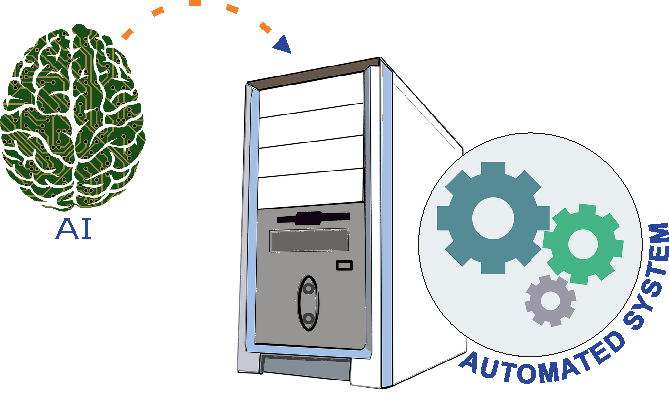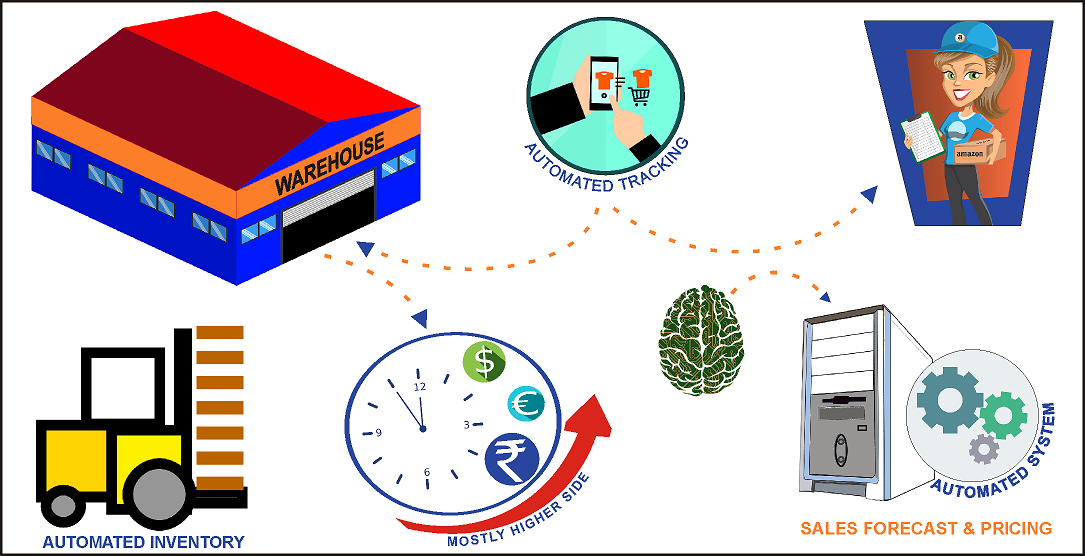With time Artificial Intelligence is gaining importance in our daily lives. We start our day with asking Google to play our favorite song, tell us about the weather and ask for directions and on weekend we are too busy ordering food, shopping groceries or scrolling through latest fashion apps. How do we get what we order?  How do our wholesalers know what we want and how do they reach us the exact time? Managing customers and keeping them engaged with your brand is must for every business. AI in wholesale or retail industry can greatly enhance quality of customer engagement by providing personalized customer service, apart from automating several business processes.
How do our wholesalers know what we want and how do they reach us the exact time? Managing customers and keeping them engaged with your brand is must for every business. AI in wholesale or retail industry can greatly enhance quality of customer engagement by providing personalized customer service, apart from automating several business processes.
Accenture research indicates – “AI has the potential to boost rates of profitability by an average of 38 percent by 2035 and lead to an economic boost of $14 trillion across 16 industries in 12 economies by 2035“. Specifically, the report on AI in wholesale or retail industry says: “AI can yield more than $2 trillion in additional GVA* in 2035 for the Wholesale and Retail sector – an increase of 36 percent compared with the baseline case“.
* Gross Value Added (GVA) is a close approximation of GDP. It is an output measure that accounts for the value of goods and services produced in a certain sector. It can be thought of as the contribution of different sectors to economic growth.
 Wholesalers & Retailers can benefit from AI-enabled intelligent systems as this would automate and streamline routine processes like inventory management, warehouse management, logistics and augmented reality technology will allow them to provide exceptional customer experiences.
Wholesalers & Retailers can benefit from AI-enabled intelligent systems as this would automate and streamline routine processes like inventory management, warehouse management, logistics and augmented reality technology will allow them to provide exceptional customer experiences.
Role of AI in Wholesale or Retail Industry:
 Networks bring in a lot of data, but merely small amount is used. This means when an issue arises, an alarm is raised in the network and wholesalers must respond to it quickly. Introduction of AI in the data network allows wholesalers to use this unused data to identify new trends, analyze historical patterns and also helps in building predictive models for future planning and decision-making. AI also helps in maintaining the health of the data network.
Networks bring in a lot of data, but merely small amount is used. This means when an issue arises, an alarm is raised in the network and wholesalers must respond to it quickly. Introduction of AI in the data network allows wholesalers to use this unused data to identify new trends, analyze historical patterns and also helps in building predictive models for future planning and decision-making. AI also helps in maintaining the health of the data network.
 AI helps wholesalers and retailers to improve service assurance and management. AI-powered tools and systems identify ticket/requests raised by customers and then dig deep to identify different types of requests, patterns and diagnose issues, spot false positives, run some tests and resolve issues automatically. AI has the ability to identify and solve problems automatically and predict new problems before they even happen. Thus, by predicting future risks or problems, it helps in reducing costs and resources required in resolving the problem.
AI helps wholesalers and retailers to improve service assurance and management. AI-powered tools and systems identify ticket/requests raised by customers and then dig deep to identify different types of requests, patterns and diagnose issues, spot false positives, run some tests and resolve issues automatically. AI has the ability to identify and solve problems automatically and predict new problems before they even happen. Thus, by predicting future risks or problems, it helps in reducing costs and resources required in resolving the problem.
 Customers have endless options to reach different sellers of their choice. For wholesalers and retailers, it is difficult to keep a track of customers and engage them. The traditional methods include customer care phone calls and connecting on social media channels. But, today AI helps in connecting with the customers 24/7 and it also keeps customer preferences in mind and suggests whenever the customer contacts the seller. With the help of AI-enabled tools, sellers can create specific buyer personas and save the buyers choices and allowing wholesalers to offer personalized services. An AI-based platform can be integrated across various channels, apps, devices, payment gateways, and call centers and collect information from each source to create a buyer profile. This allows wholesalers to customize products, offers, and discount according to individual customers and push relevant content to them.
Customers have endless options to reach different sellers of their choice. For wholesalers and retailers, it is difficult to keep a track of customers and engage them. The traditional methods include customer care phone calls and connecting on social media channels. But, today AI helps in connecting with the customers 24/7 and it also keeps customer preferences in mind and suggests whenever the customer contacts the seller. With the help of AI-enabled tools, sellers can create specific buyer personas and save the buyers choices and allowing wholesalers to offer personalized services. An AI-based platform can be integrated across various channels, apps, devices, payment gateways, and call centers and collect information from each source to create a buyer profile. This allows wholesalers to customize products, offers, and discount according to individual customers and push relevant content to them.
 Earlier in a traditional setup, ticket management was a time-consuming task, where an employee was assigned to read every single ticket and then route them based on the content. Later with some customer service software, these tickets were automatically routed but in a random manner, which created more confusion. When AI came into the picture ‘ticket management’ has become simpler and faster as AI can read the content of the ticket and then move them into specific categories. AI also understands the emotions or tone behind the content if it’s positive, negative or neutral. So, AI helps in the exact routing of the tickets to the right person.
Earlier in a traditional setup, ticket management was a time-consuming task, where an employee was assigned to read every single ticket and then route them based on the content. Later with some customer service software, these tickets were automatically routed but in a random manner, which created more confusion. When AI came into the picture ‘ticket management’ has become simpler and faster as AI can read the content of the ticket and then move them into specific categories. AI also understands the emotions or tone behind the content if it’s positive, negative or neutral. So, AI helps in the exact routing of the tickets to the right person.
![]() Before AI jumped in the customer service role, manual agents used to handle customer requests, issues and queries. Manual involvement of humans meant delayed responses, errors in responses, misinterpretation of data. But with AI all this becomes history, as AI systems tag, categorize and index data automatically. With AI, there are zero chances of error, a right solution to the problem and better connectivity with customers, more personalized and timely responses. Robots will be soon replacing humans in handling customer queries and be omnipresent across different channels 24/7. This is being touted as omnichannel experience and the word e-commerce is being replaced with Digital Commerce to reflect this experience.
Before AI jumped in the customer service role, manual agents used to handle customer requests, issues and queries. Manual involvement of humans meant delayed responses, errors in responses, misinterpretation of data. But with AI all this becomes history, as AI systems tag, categorize and index data automatically. With AI, there are zero chances of error, a right solution to the problem and better connectivity with customers, more personalized and timely responses. Robots will be soon replacing humans in handling customer queries and be omnipresent across different channels 24/7. This is being touted as omnichannel experience and the word e-commerce is being replaced with Digital Commerce to reflect this experience.
 Artificial Intelligent chatbots when integrated with online support systems can resolve small problems like password resets, order updates and automated responses for simple queries. This encourages shorter response time and better communication channel. Chatbots and other virtual assistants can even sense human emotions and respond accordingly. Wholesalers can now create more intelligent, intuitive and efficient customer responses.
Artificial Intelligent chatbots when integrated with online support systems can resolve small problems like password resets, order updates and automated responses for simple queries. This encourages shorter response time and better communication channel. Chatbots and other virtual assistants can even sense human emotions and respond accordingly. Wholesalers can now create more intelligent, intuitive and efficient customer responses.
 AI can help sale professionals to focus on the buying trends of customers. It will help in knowing target markets and convert them into potential customers. AI allows segregation of customers and creates targeted marketing campaigns. Wholesalers can decide on offers, discounts, and promotions and predict sales in the future within a specific time frame. Based on the past sales, losses, price elasticity and historical sales data wholesalers can also predict pricing for the products. Dynamic Pricing is a concept that is being followed by wholesalers these days that allows them to price the products on the basis of demand and supply relationships. This type of pricing works at a more granular level and proves to be a key driver for business growth.
AI can help sale professionals to focus on the buying trends of customers. It will help in knowing target markets and convert them into potential customers. AI allows segregation of customers and creates targeted marketing campaigns. Wholesalers can decide on offers, discounts, and promotions and predict sales in the future within a specific time frame. Based on the past sales, losses, price elasticity and historical sales data wholesalers can also predict pricing for the products. Dynamic Pricing is a concept that is being followed by wholesalers these days that allows them to price the products on the basis of demand and supply relationships. This type of pricing works at a more granular level and proves to be a key driver for business growth.
AI is improving communication and enhancing customer service by making employees smarter, automating business processes and thereby transforming businesses to be more responsive and intelligent to adapt to varying customer demands. Omnichannel communication promotes better customer engagement and reach.

